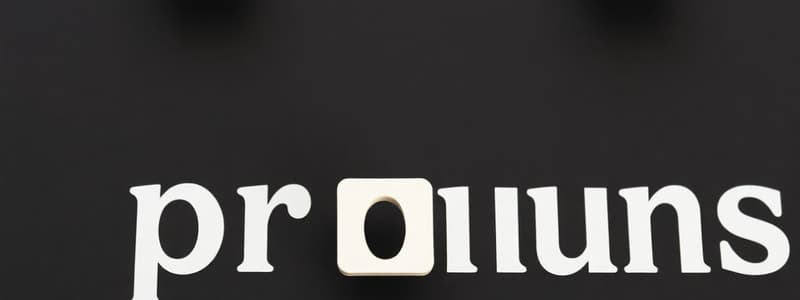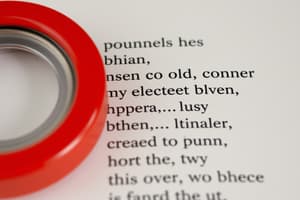Podcast
Questions and Answers
What is the function of the infinitive 'to polish' in the sentence provided?
What is the function of the infinitive 'to polish' in the sentence provided?
- It modifies a verb.
- It serves as an adjective. (correct)
- It is used as a pronoun.
- It acts as a noun.
Which of the following correctly describes a proper adjective?
Which of the following correctly describes a proper adjective?
- An adjective that is formed from common nouns.
- An adjective that modifies a pronoun.
- An adjective that limits a verb's action.
- An adjective derived from a proper noun and starts with a capital letter. (correct)
What suffixes are often used to create proper adjectives?
What suffixes are often used to create proper adjectives?
- -ful, -able, -ous
- -an, -lan, -ese (correct)
- -ize, -ment, -ly
- -ed, -ing, -y
When is the definite article 'the' used?
When is the definite article 'the' used?
Which statement about the addition of '-d' or '-ed' to verbs is true?
Which statement about the addition of '-d' or '-ed' to verbs is true?
In the phrase 'the officer returned to help,' what role does 'to help' serve?
In the phrase 'the officer returned to help,' what role does 'to help' serve?
What does an adjective typically tell us about a noun?
What does an adjective typically tell us about a noun?
What is the role of predicate adjectives in a sentence?
What is the role of predicate adjectives in a sentence?
What is the function of an indefinite pronoun?
What is the function of an indefinite pronoun?
Which of the following is an example of an interrogative pronoun?
Which of the following is an example of an interrogative pronoun?
How is the number of a pronoun determined?
How is the number of a pronoun determined?
What type of pronoun begins a subordinate clause?
What type of pronoun begins a subordinate clause?
What does a relative pronoun refer to?
What does a relative pronoun refer to?
Which of the following is NOT a property of pronouns?
Which of the following is NOT a property of pronouns?
What do action verbs express?
What do action verbs express?
Which interrogative pronouns are used to inquire about people?
Which interrogative pronouns are used to inquire about people?
What is the main function of a pronoun in a sentence?
What is the main function of a pronoun in a sentence?
Which of the following is an example of a reflexive pronoun?
Which of the following is an example of a reflexive pronoun?
What distinguishes an intensive pronoun from a reflexive pronoun?
What distinguishes an intensive pronoun from a reflexive pronoun?
Which case of personal pronouns is used for the subject and predicate nominative?
Which case of personal pronouns is used for the subject and predicate nominative?
In which scenario would a possessive pronoun be used alone?
In which scenario would a possessive pronoun be used alone?
Which of the following sentences contains a demonstrative pronoun used before a noun?
Which of the following sentences contains a demonstrative pronoun used before a noun?
Which type of pronoun is characterized by the addition of -self or -selves?
Which type of pronoun is characterized by the addition of -self or -selves?
What is a critical aspect of possessive pronouns?
What is a critical aspect of possessive pronouns?
What do adverbs of manner primarily answer?
What do adverbs of manner primarily answer?
Which of the following is NOT a type of adverb mentioned?
Which of the following is NOT a type of adverb mentioned?
What does an adverb of degree modify?
What does an adverb of degree modify?
In the sentence 'Warren walks too quickly,' what does 'too' modify?
In the sentence 'Warren walks too quickly,' what does 'too' modify?
Which of the following correctly describes the function of adjectives in comparison?
Which of the following correctly describes the function of adjectives in comparison?
Which type of adverb answers the question, 'How often does something happen?'
Which type of adverb answers the question, 'How often does something happen?'
What is the primary purpose of an adverb?
What is the primary purpose of an adverb?
Where can an adverb typically be placed in a sentence?
Where can an adverb typically be placed in a sentence?
What is the primary function of a coordinating conjunction?
What is the primary function of a coordinating conjunction?
Which of the following is not a coordinating conjunction?
Which of the following is not a coordinating conjunction?
What do correlative conjunctions do?
What do correlative conjunctions do?
Identify the correct example of a compound preposition.
Identify the correct example of a compound preposition.
Which of the following sentences correctly uses a coordinating conjunction?
Which of the following sentences correctly uses a coordinating conjunction?
Which phrase contains an object of the preposition?
Which phrase contains an object of the preposition?
How many pairs of correlative conjunctions are listed?
How many pairs of correlative conjunctions are listed?
Which of the following sentences uses an interjection correctly?
Which of the following sentences uses an interjection correctly?
Flashcards are hidden until you start studying
Study Notes
Pronouns
- Pronouns are words that replace nouns in a sentence.
- An antecedent is the noun or noun phrase to which a pronoun refers.
- Indefinite Pronouns refer to people, places, or things in a general way. They do not have specific antecedents.
- Examples: everyone, anyone, something, nothing
- Interrogative Pronouns are used to form questions and include words like: who, whom, whose, what, which
- Relative Pronouns begin subordinate clauses and refer to the noun or pronoun they follow.
- Examples: who, whom, whose, which, that
Properties of Pronouns
- Number: Singular or Plural depending on the noun it represents.
- Gender: Matches the gender of the noun it represents.
- Person: First person (I, we), Second person (you), Third person (he, she, it, they)
- Case: Determined by the pronoun’s function in the sentence (nominative, objective, possessive)
Reflexive and Intensive Pronouns
- Reflexive pronouns reflect an action back to the subject.
- Examples: myself, yourself, himself, herself, itself, ourselves, yourselves, themselves
- Intensive pronouns emphasize another noun or pronoun in the same sentence.
- Examples: I myself, she herself, they themselves
Demonstrative Pronouns
- These pronouns refer to specific people, places, things, or ideas.
- Examples: this, that, these, those
Verbs
- Verbs express action, a condition, or a state of being.
Types of Verbs
- Action Verbs tell what someone or something does. They can express physical or mental action.
- Linking Verbs connect the subject of a sentence to a word or phrase that renames or describes it.
- Examples: be, seem, appear, become, feel, taste, smell, sound, look, grow, remain, stay
Adjectives
- Adjectives modify nouns or pronouns, providing more information about them.
- They describe the kind, which one, how many, or how much.
- Proper Adjectives are formed from proper nouns.
- Example: Dutch painter, Berlin Wall
Adverbs
- Adverbs modify verbs, adjectives, or other adverbs.
- They answer questions like: how, when, where, to what extent, how often.
- Types of Adverbs:
- Manner: Quickly, terribly, well
- Place: Outside, downstairs, everywhere
- Time: Afterwards, yesterday, eventually
- Degree: Very, almost, extremely
- Frequency: Never, rarely, sometimes, always
Comparing Adjectives
- Many adjectives have different forms to indicate the degree of comparison:
- Positive: (original form)
- Comparative: (comparing two things)
- Superlative: (comparing three or more things)
Conjunctions
- Conjunctions connect words, phrases, and clauses in a sentence.
- Coordinating Conjunctions connect words or groups of words of equal importance.
- Examples: for, and, nor, but, or, yet, so
- Correlative Conjunctions are pairs of conjunctions that connect equal parts of a sentence.
- Examples: both/and, either/or, neither/nor, not only/but also, whether/or
Interjections
- Interjections express strong emotions or surprise.
- Examples: Wow!, Ouch!, Stop!, Help!
- Interjections are usually followed by an exclamation point.
Studying That Suits You
Use AI to generate personalized quizzes and flashcards to suit your learning preferences.




